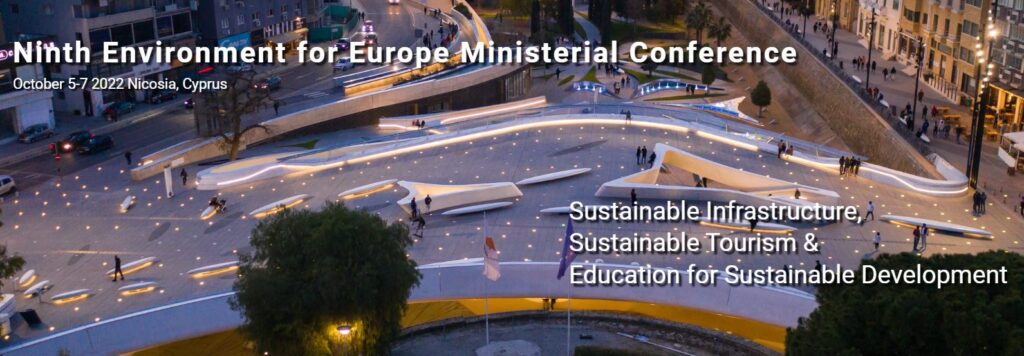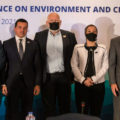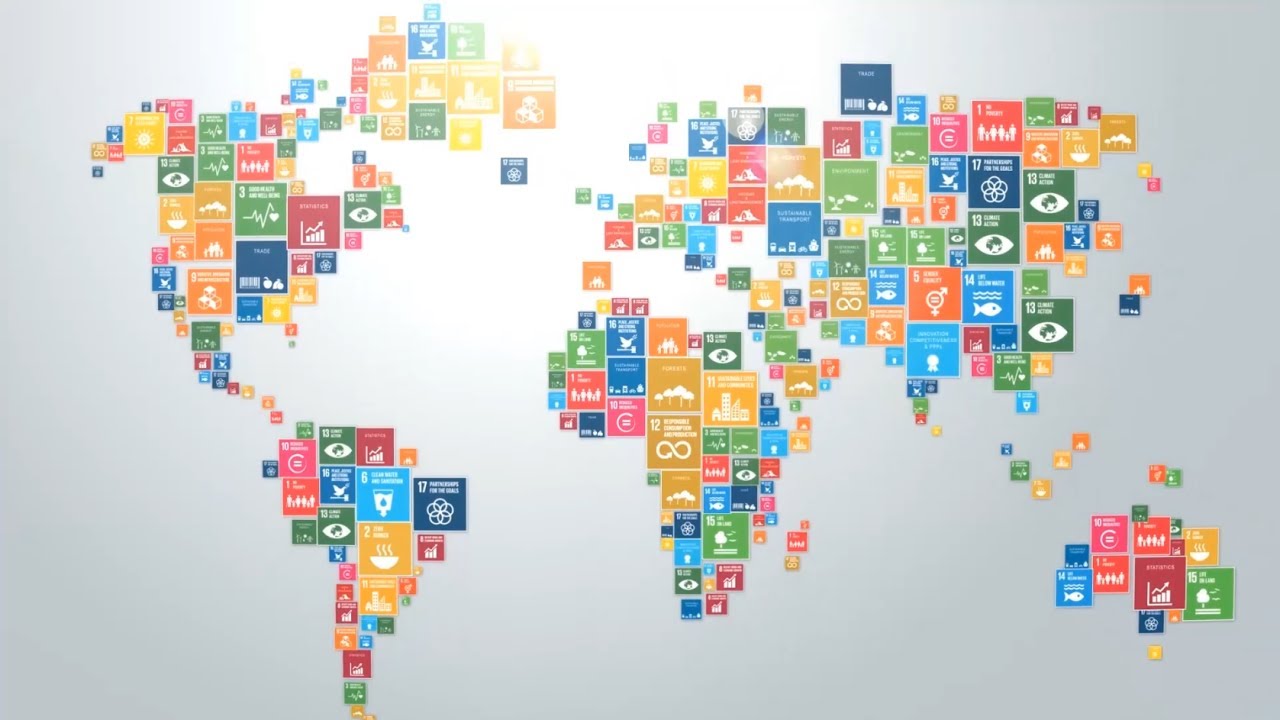Cyprus will host in a few days one of the biggest high level conferences to be ever organized in the Mediterranean region, the 9th Ministerial Conference on the Environment for Europe of the United Nations Economic Commission for Europe (UNECE).
This is a huge challenge and honour for Cyprus which will gather together between 5-7 October 71 Ministers/Deputy Ministers, 980 Participants, 150 Organizations, and 60 Youth Organizations from 56 countries. In addition, 4 High Level Meetings 40 side-events and more than 150 bilateral/trilateral meetings are organized, most of them to be held at Filoxenia conference center in Nicosia. Filoxenia translates into hospitality.
Dr. Aravella Zachariou, Coordinator of the National Secretariat for UNECE unveiled the most important pillars of the Conference during a press event held Thursday evening.
She noted that this is the first time that invited countries are not members in the UNECE region and the first time that such a high level conference is organised exclusively on sustainable principles. She also said that this is the first time that such a high political forum combines policies with arts and culture and the first time that so many strategic policies and plans for environment, sustainability and education for 2030 will be adopted.
Dr. Zachariou also said that this is the first time where education has a central role in such a high level conference and where youth participants are involved so actively.
Ministers of Education and Environment, the Public and Private Sector, Youth, International Organizations, Regional Organizations, Non-Governmental Institutions, Business and Academia will be represented in the conference which will adopt four Strategic Policies for 2030 namely Sustainable Infrastructure, Sustainable Tourism, Education for Sustainable Development and the MED ESD Action. A Ministerial Declaration for the Environment and a Ministerial Statement on ESD are expected.
The Conference is solely sustainable. Participants will be driven in a shuttle bus and food and beverage are from local produce. There will be no food waste as all leftovers will be donated to people in need. Furniture and other items to be used are recyclable and will be reused and the plants and trees at Filoxenia center will be replanted in school yards.
She also spoke of the role of the Press and Information Center (PIO) in carrying out this huge task and the excellent cooperation and collaboration with its Director and staff.
PIO Director Aliki Stylianou said that this is the largest ever event that has happened in Cyprus , noting that it is a joint mission in which we all are asked to contribute.
Gifts: Korokolios and Pithkiavli
——
The participants will be given gifts which represent the rural life of Cyprus and its rich culture. Korokolios is a small straw basket with a lid, which is made by weaving palm leaves, or grass (floudi) found in abundance near water sources (rivers or lakes). The Cypriot families stored edible food inside korokolios whilst the local shepherds carried their lunch (olives, halloumi cheese, bread and other edibles) in Korokolios wicker baskets.
It is believed that “pithkiavli” is the most ancient Cypriot musical wind instrument. Findings from the sanctuary of Aphrodite in Pafos evidence the use of the flute since 2500 B.C. Even in the medieval church of Archangel Michael in Pedoulas village on the Troodos mountain range, there is the Nativity mural of the 15th century depicting “pithkiavli”.
The “pithkiavli” is made from reeds. Each one has its own sound and clarity, depending on its diameter and pipe length. The maker of “pithkiavli” must cut the reeds during December’s full moon. The makers and players of the instrument were mainly shepherds.
The “pithkiavli” was the ideal companion of the shepherds for the long and endless hours in the fields, especially in the summer, when the shepherds had to stay overnight in the fields. This habit was called “tzimistron”; the animals couldn’t graze well during the day due to the high temperatures and the shepherds used to sleep in the fields with them so they could graze early in the morning or late afternoon. The sounds of “pithkiavli” were also the communication system between the animals and the shepherds. Each sound and melody was associated to a specific task like, for example, that “it’s time to stop grazing”, or “it’s time to go back to the pen”, or “it’s time for water”.
The message from the UN
——
Olga Algayerova, the United Nations Under-Secretary-General & Executive Secretary of the United Nations Economic Commission for Europe sent a message, which was distributed to the press, ahead of the Conference noting the importance of the Environment for Europe (EfE) process which was was created in 1991.
She said that this year the the Ninth “Environment for Europe” (EfE) Ministerial Conference will have three main themes: Greening the economy in the pan-European region, applying principles of circular economy to sustainable tourism, with a view to reducing water and energy use and greenhouse gas emissions from tourism, particularly in high-impact sub-sectors (including cruise lines, aviation and accommodation), as well as improving efficiency in sanitation, wastewater treatment and waste management and advancing Education for sustainable development, as a powerful catalyst for the transition towards more resilient systems and the implementation of all the Sustainable Development Goals.
Algayerova said that the Conference will also discuss the findings of the 7th pan-European environmental assessment report, taking stock of progress made and remaining challenges since the 6th assessment in 2017, will review progress on the establishment of the Shared Environmental Information System and will launch the 4th cycle of UNECE Environmental Performance Reviews.
She also said that It is expected to adopt a Ministerial declaration which will outline the direction of future regional cooperation on environment in general, and especially on Sustainable infrastructure and sustainable tourism. The 3rd High-Level Meeting of Education and Environment Ministries which will be held in the framework of the Conference is expected to adopt the Ministerial Statement on education for sustainable development.
Great honour and challenge for Cyprus
—–
Minister of Agriculture Costas Kadis delivered a brief speech saying that it is a great honour for Cyprus to host this conference which takes place for the first time in the Mediterranean region, with participants from the Mediterranean, the Middle East, Asia and of course Europe.
He noted that the challenges the invited countries are facing are common adding that this Conference is an opportunity to share experiences and best practices at an inter-ministerial level for building sustainable solutions in the fields of the environment, circular economy, tourism, infrastructure and education. Our aim, he said, is to fully achieve the goals of the twenty thirty (2030) United Nations’ Agenda.
Kadis also mentioned that this Ninth Ministerial Conference will mark thirty (30) years of environmental cooperation in the pan-European region.
Discussions during the plenaries of the Conference, the Minister said, will provide significant input for two policy documents and the Ministerial Declaration to be adopted by the participants, adding that these outcomes will provide the supporting framework for formulating our national strategies.
Education Minister Prodromos Prodromou in his speech said that the 8th Ministerial Conference was organised in 2016 by the Government of Georgia in Batumi and attracted around 700 hundred participants. Our ambition, he noted, is to build upon this legacy and further enhance participation by bringing together people from different parts of the world.
Prodromou said that conference participants will be given the opportunity to share experiences, to interact and commit on shared plans, which can transform our planet.
He added that its uniqueness lies on the fact that Education for Sustainable Development is given a special emphasis. According to the Minister, the importance of Education for Sustainable Development is documented in the UNECE Education for Sustainable Development Policy Implementation Framework 2021-2030, which will operate as a guiding framework for transforming our national policies on the subject.
He said that youth will also be at the spotlight of the Conference, since the new implementation framework on the UNECE ESD Strategy 2021-2030, that will be adopted by the Ministers of Education, aims to bring together the past with the future by actively engaging young people.
Prodromou also said that the Conference provides a unique opportunity for interdepartmental and inter-ministerial collaboration, which is the key to confront the emerging challenges and risks that we are facing as humanity because of the environmental degradation. He also spoke of the role of the media which is critical for the communication of the message of the Conference, namely “to transform our planet we need to transform our plans”.


